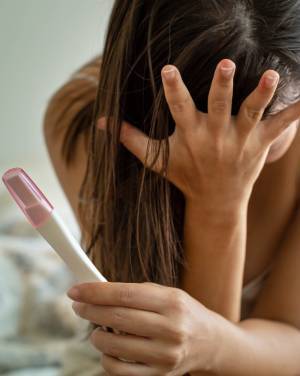How Soon Can You Get Pregnant after an Abortion
🚺 Pregnant after having had an abortion? — Take the Quiz
- It is possible to become pregnant within your next menstrual cycle, right after an abortion.
- If you are holding a positive pregnancy test just after an abortion, it may be a false reading due to the pregnancy hormones still present in your body.
- Some women desire to have a baby soon after an abortion. Many emotions may surface in this situation.
-
Pregnant after Abortion Quiz
Is It Possible to Become Pregnant Right after a Termination?
False-Positive Pregnancy Test Soon after an Abortion?
No Period after Abortion?
Wanting a Baby after Abortion
What Are the Risk Factors for a New Pregnancy? Can Abortion Cause Infertility?
(Maybe) Pregnant after an Abortion—Tips on Where to Go from Here
Repeat Pregnancy after an Abortion — Melanie's Story
Pregnant after Abortion – Quiz
Are you presently dealing with this situation? Take the self-assessment by answering three multiple-choice questions, and an immediate evaluation will appear on your screen.
Is It Possible to Become Pregnant Right after a Termination?
It is theoretically possible for a woman to become pregnant during her next cycle after the abortion.
However, following an abortion, it may take some time until your menstrual cycle returns to normal and your first ovulation happens. This is especially true in the case of medical abortions, which tend to throw your hormone levels out of balance.
False-Positive Pregnancy Test Soon after an Abortion?
A few weeks after an abortion, the test may show a positive result even though you are not pregnant.
Some tests are very sensitive and respond to even very low levels of the pregnancy hormone ßHCG. In this case, a pregnancy test would show positive, because the ßHCG produced during pregnancy can still be detected in the woman's body for some time after an abortion.
This means that a standard test may give a positive reading for up to six weeks after an abortion, even though you are not pregnant. Digital tests are especially sensitive and, therefore, cannot be used within eight weeks of an abortion.
- Tip: If in doubt, make an appointment to see your doctor. Your physician can ascertain via ultrasound whether you are pregnant or not. In addition, your health professional can take two blood samples a few days apart to determine whether your level of ßHCG hormones is increasing.
No Period after Abortion?
Typically, the first period following an abortion occurs after four to six weeks. It can take some time, however, for the hormone balance and menstrual cycle to return to normal before the first period starts again. It is also possible that bleeding will be either heavier or lighter the first time after the abortion. Consult a physician if you have concerns or a missed period for an extended amount of time.
- Note: Your first ovulation, which takes place prior to your first period, marks the possibility of a new pregnancy. It is impossible to predict when you will start ovulating again. If you are not wanting to become pregnant, using contraception after an abortion is recommended. Your doctor will be able to advise you. Additionally, it is advised to refrain from sexual intercourse while your body is recovering and healing.
Wanting a Baby after Abortion
During counseling, women frequently share about their desire for a baby immediately following an abortion.
Sometimes, this desire arises from abortion regret because deep down inside, they had actually wanted the baby. The reasons, circumstances, and emotions surrounding this desire may vary significantly.
Maybe you share this longing for a baby—but you’re still unsure how to handle another pregnancy. You might still be sorting out your emotions. Or maybe you are still coming to terms with what lies behind you.
Solutions often present themselves, dismantling obstacles and making life with a baby a viable option.
What Are the Risk Factors for a New Pregnancy? Can Abortion Cause Infertility?
Apart from any practical or emotional concerns, you may also be worried about potential risk factors in becoming—or desiring to become—pregnant so soon after an abortion. But usually, there are no particular complications.
Some studies suggest that a surgical abortion might slightly increase the risk of preterm birth in future pregnancies, and repeated abortions could further increase this risk. Other studies have negated these findings.
Whether abortion can lead to infertility is also unclear. With ever-improving medical standards, complications from abortions are very rare, yet possible. A surgical abortion may cause injuries to the uterus, which could pose challenges for future pregnancies.
Remember:
- Take advantage of your follow-up appointment (usually 1-4-2 weeks after the abortion). The timing varies depending on the clinic. During this check-up, your doctor can assess whether there were any injuries or complications and whether the abortion was complete. When needed, a curettage (D&C) may be performed.
- Discussing previous pregnancies with your doctor, including C-sections, previous miscarriages, and abortions, and allowing this information to be added to your medical records will allow your doctor to better assess possible risk factors.
(Maybe) Pregnant after an Abortion—Tips on Where to Go from Here
You may have had an abortion recently, or at some point in the past. You probably had to traverse some rough terrain! You had weighed up the situation and the implications and finally decided to take that step. More than anything, you probably just want to have time to yourself in order to come to terms with what has happened.
But now you are (possibly) pregnant again and many questions may rise back to the surface:
- Take time to let this news sink in. Allow yourself the time you need to clear your thoughts.
- You may find it helpful to confide someone you trust regarding this new situation.
Additionally, use our free digital tools to help you discern which path to take: - ⚖️ Pregnant and unsure which route to take this time? Take the Abortion Test
- ❤️ Sign up for our week-long Decision Coaching and receive a daily email for seven days, packed with ideas, food for thought, and tools for making a good decision.
Repeat Pregnancy after an Abortion — Melanie's Story
"I honestly don't know what to do. My boyfriend and I have only been together for a few months, and he definitely doesn't want the baby because he thinks it is too soon. To him, abortion is the only option. I already had an abortion two years ago and regretted it immensely afterward. It weighed on me emotionally and haunted me for months. Now, I'm considering it again, even though I had told him right away that I wanted to keep the baby and that abortion was not an option for me. But I am afraid that I might become a single mom, even though I would not have any money worries. I have a steady income, etc.
I don't know what to do. If I went through with it, I doubt I could continue dating someone who asks me to do such a thing.” *
This is how Melanie* described her situation during a Profemina counseling session. Does her story resonate with you in some way?
(*The name was changed to protect her identity)
FAQs
-
It is possible to get pregnant within the following menstrual cycle if ovulation takes place. But it may take a while for your cycle to resume, especially if you had a medicinal abortion. In rare instances, abortion may cause infertility. Sometimes the desire for a baby surfaces immediately following an abortion. If a baby had been part of your life plan all along, don't allow external pressures to affect your decision. Take sufficient time to think it through!
-
In rare cases, abortion can cause infertility. Even though this is uncommon, it is shattering to those affected - because many women, who pursue abortion, desire to have children one day.
-
Pregnancy hormone levels may remain elevated within the weeks following an abortion. Therefore, a pregnancy test may still be able to trace the pregnancy hormone ßHCG.
Of course, a new pregnancy could also cause the test to react. If you are unsure, see your medical provider.






